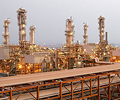

Over three days of face-to-face meetings in the Middle East — a crossroads of sorts for LNG supply and demand — the world’s biggest natural gas market participants exchanged outlooks.
The executives, traders, engineers, and consultants also shared ideas for controlling fossil fuel emissions, technical innovations for cutting project costs, and thoughts about geopolitical and regulatory opportunities and challenges facing the industry.
So happy to be off Zoom and back in front of people almost two years after the coronavirus pandemic first erupted, one American CEO said he wanted to hug everyone in the room.
The scorecard from Gastech in Dubai? Not much dealmaking, as buyers remain skittish about committing to new long-term investments, due to price volatility, fears about creating another overbuild, and COVID-19 hangover.
“We’re in a business that is built on and set for the long-term,” Cheniere Energy’s Chief Commercial Officer Anatol Feygin told S&P Global Platts during the conference. “It’s hard to say which environment we like less – the very low price and flat globally environment of a year ago or this very elevated environment.”
During the conference, a Shell official said the company was in talks with Iraq over boosting Basra Gas Co.’s processing capacity to 2 Bcf/d in the near future. Part of the calculation will be determining where future gas supplies will come from.
Elsewhere, Azerbaijan said it was supplying up to 5 million cu m/d of gas to Russia under a new swap deal that will see Moscow deliver similar volumes back to Azerbaijan during the winter. And Pakistan GasPort, the operator of the country’s largest liquefied natural gas import terminal, said it aimed to finalize by October a term supply contract for 18 cargoes annually starting from this November for the next five to 10 years. Contenders were said to be expected to beat the terms underpinning two contracts Pakistan has signed with Qatar Gas.
Even India’s Petronet LNG, which last year allowed a preliminary investment deal with Driftwood LNG developer Tellurian to expire without being finalized, expressed willingness to engage in talks about term offtake from any supplier. The caveat – as long as the cargoes are affordable. Tellurian, which in the past has used Gastech to showcase its Louisiana project with an extravagant booth centrally located on the exhibition floor, didn’t set up one this time.
While there were nibbles around the edges of the market, the conference did not produce any major firm long-term offtake agreements that might help developers sanction a new liquefaction or regasification project. There were notably no commercial announcements from North American developers – several did not send speakers or set up exhibition booths.
Bullish prices
To be sure, the huge run-up in global gas prices over the last year was perhaps the No. 1 reason cited during the conference for new investment hesitancy.
The S&P Global Platts JKM for November was assessed Sept. 24 at $26.797/MMBtu, almost 5 ½ times what the benchmark price for spot-traded deliveries to Northeast Asia was assessed at on the same day a year ago. In Europe, Platts assessed the Dutch TTF November contract on Sept. 24 at $24.120/MMBtu, a sixfold jump from a year ago.
Notwithstanding the challenges in the market and amid the global energy transition, Venture Global LNG CEO Michael Sabel sounded a positive note at the conference, in part because of the ability for participants to be in the same room.
While the developer did not announce any deals at the conference and declined to speak to reporters, it has been one of the most successful US players over the last several years signing commercial agreements to support its Calcasieu Pass and Plaquemines LNG export projects in Louisiana.
“I want to hug everybody,” Sabel said during a session. “We’re coming out of an unbelievable time, two years. To see everyone and be together is great.”
Source: Platts